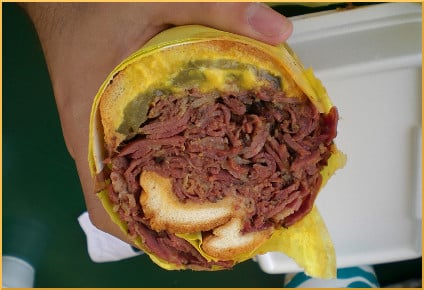Here is an interesting observation from Dr. Pretlow, an insight gleaned from the pilot studies of the W8Loss2Go smartphone app:
We initially thought that processed food wasn’t that much of a problem for obese kids, that it was mainly excessive amounts at home meals. But in our recent study the kids took photos of all their home meals. Pizza and chicken nuggets were the most common home meal food items.
The line between fast food and a home-cooked dinner seems to have become blurred to the point of nonexistence. To get hold of monstrously deformed versions of food, it’s no longer even necessary to go to McDonald’s or any of its competitors, or even to pick up a phone and order a delivery of junky pseudo-food. It’s all right there in the refrigerator, because somebody brought it home from the grocery store.
As we have seen, the ingredients of many so-called foods do not stand up to close inspection. When the eloquently named “Cheeseburger Bill” was discussed back in 2005, Michele Simon theorized about why food manufacturers fervently wish to avoid court cases. “Discovery,” in the legal sense, is a term that strikes terror into their hearts, or whatever facsimiles of hearts they might possess.
There is more for them to worry about than a census of weevils in the flour or roach parts in the raisins. Much more is in need of protection. The legal process could potentially expose a breathtaking number of dirty little secrets.
We’re listening…
What might be revealed? How about evidence that the industry has intentionally and with full awareness caused a food addiction epidemic? What if that happened? A human body can be chemically manipulated to lose its sense of “enough” and become a perpetual motion machine that does practically nothing but eat. Simon wrote:
Recent studies reveal that some unhealthy foods — such as chocolate, sugar, meat, and cheese — are physically addictive. Overeaters also demonstrate typical addiction behaviors such as craving, loss of control, and relapse. Lawsuits could help uncover the extent to which the food industry has known about, concealed, and taken advantage of such food addictions.
Another expert
William Anderson is a licensed mental health counselor who specializes in addiction, eating disorders, and weight loss, which are all related. Like Dr. Pretlow, he has been using the term “food addiction” for a long, long time. (Eventually, a large part of the medical establishment caught up with these gentlemen.)
Anderson explains how food companies have done so much to create the obesity epidemic, and incidentally, how they have drained the American taxpayer who is faced with enormous health care costs due to obesity-related diseases. This piece is so fascinating, it is difficult to pick out a sentence or two for quotation, but here goes:
In November of 1998, the five largest tobacco companies in the U.S. agreed to pay 46 states over $200 billion to reimburse them for the Medicaid costs due to cigarette smoking. And that was just the beginning. Over the years, the tobacco companies have paid out billions more to the people they hurt, both medical expenses and punitive damages, and there’s no end in sight.
Is that little taste tantalizing enough to send a reader straight to Anderson’s article?
Your responses and feedback are welcome!
Source: “Industry Rewrites Laws to Avoid Liability,” CorpWatch.org, 03/21/05
Source: “Should the U.S. Sue Food Companies for the Costs of the Obesity Epidemic?” HuffingtonPost.com, 10/20/2014
Image by Marshall Astor


 FAQs and Media Requests:
FAQs and Media Requests: 











